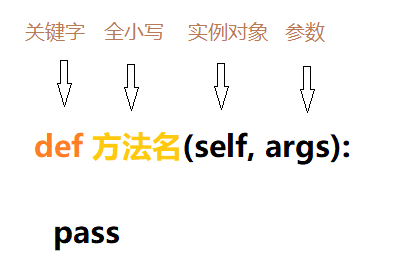1. Class method
1. Create class methods and call
Create class method

class Animal(object):
def eat(self, food):
print(f'eating {food}')
def play(self):
print('eating')
def sleep(self):
print('sleeping')
Call class method
When called, the object is used Call as an instance method
dog = Animal() #Instantiate object
dog.eat('meat') #Calling a method through an instance object
dog.play() #Calling a method through an instance object
dog.sleep() #Calling a method through an instance object
Role of self
First of all, it is clear that self exists only in the methods of the class, and independent functions or methods do not have to have self. Self is necessary when defining the methods of a class, although it is not necessary to pass in the corresponding parameters when calling.
Self name is not necessary. In python, self is not a keyword. You can define it as a or b or other names, but it is agreed to be vulgar (in order to unify with other programming languages and reduce the difficulty of understanding). Don't be different. Everyone won't understand it.
There is no error in changing self to myname in the following example:
class Animal(object):
def eat(cls, food):
print(f'eating {food}')
dog = Animal()
dog.eat('meat')
Self refers to the class instance object itself (Note: not the class itself). In the following example, self points to the dog instance of the Animal class
class Animal(object):
def eat(self, food):
print(f'eating {food}')
dog = Animal()
print(dog)
#Operation results:<__ main__. Animal object at 0x020AE508>
If self points to the class itself, which one does self point to when there are multiple instance objects? Examples are as follows:
class Animal(object):
def eat(self, food):
print(f'eating {food}')
dog = Animal()
pig = Animal()
So:
self needs to be defined when it is defined, but it will be automatically passed in when it is called.
The name of self is not stipulated to be dead, but it's better to use self as agreed
self always refers to the instance of the class at the time of the call
2. __init__ Initialization method
Init is preceded by two underscores_ init_ _ The initialization method is called automatically when instantiating an object
class Animal(object): def __init__(self): print("I'am an animal") def eat(self, food): print(f'eating {food}') def play(self): print('playing') def sleep(self): print('sleeping') dog = Animal() #Automatically called when instantiating__ init__ method#Operation results: I'am a animal
2. Class attribute
1. Instance properties
The attributes defined in an instance are called instance attributes. They are generally statically defined and are usually defined in__ init__ In the initial method; It can also be defined dynamically and externally. The following example
class Animal(object): def __init__(self, name, age): self.name = name #Instance properties self.age = age #Instance properties def eat(self, food): print(f'{self.name} eating {food}') def play(self): print(f'{self.age}-year-ols {self.name} is playing') def sleep(self): print('sleeping') dog = Animal('Teddy', 6) #Create instance object, and dog.gender = 'common' #Define the dynamic instance property through the instance object. This property is dog Exclusive dog.play() #Call instance object print(dog.gender) #Print instance properties print(dog.name) #Call the instance property through the instance object and print """ 6-year-ols Teddy is playing common Teddy """ pig = Animal('Paige', 3) #Create instance object pig.play() #Call instance object print(pig.name) #Call the instance property through the instance object and print print(pig.gender) #Print instance properties-----Report an error because gender yes dog Object specific properties """ print(pig.gender) #Print instance properties AttributeError: 'Animal' object has no attribute 'gender' 3-year-ols Paige is playing Paige """
2. Class attribute (class variable)
-
Private attribute: if the name of the attribute starts with two underscores, it is a private type; Can only be called within a class
-
Public attribute: if the name of the attribute does not start with two underscores, it is a public attribute; Both inside and outside the class can be called
class Animal(object): age = 5 #Class attribute (public) __gender = 'mother' #Class properties (private) def __init__(self, name): self.name = name #Instance properties def eat(self, food): print(f'{self.name} eating {food}') print(Animal.__gender) #Pass within class Animal Object calls private class properties def play(self): print(f'{self.age}-year-ols {self.name} is playing') def sleep(self): print('sleeping') dog = Animal('Teddy') #Instantiate object dog.eat('meat') #Calling instance methods by instantiating objects print(f"{dog.name}'s age is {dog.age}") #Print class properties through instance objects: age----5 print(dog.__gender) #An error is reported. Private class properties cannot be called outside the class through the instance object print(Animal.__gender) #An error is reported. Private class properties cannot be called outside the class through the instance object pig = Animal('Paige') #Instantiate object print(f"{pig.name}'s age is {pig.age}") #Print class properties through instance objects: age---5 print(f"Animal's age is {Animal.age}") #Print class properties: age ---5
3. Modify class properties through instance properties
class Animal(object): age = 5 #Class properties (shared) def __init__(self, name): self.name = name #Instance properties def eat(self, food): print(f'{self.name} eating {food}') def play(self): print(f'{self.age}-year-ols {self.name} is playing') def sleep(self): print('sleeping') dog = Animal('Teddy') #Instantiate object dog.age = 8 #Modify class properties through instance properties print(f"{dog.name}'s age is {dog.age}") #Print instance properties del dog.age #Delete instance properties print(f"{dog.name}'s age is {dog.age}") #Print class properties pig = Animal('Paige') #Instantiate object print(f"{pig.name}'s age is {pig.age}") #Print class properties through instance objects: age---5 Animal.age = 10 #Modify class properties print(f"Animal's age is {Animal.age}") #Print class properties: age ---10